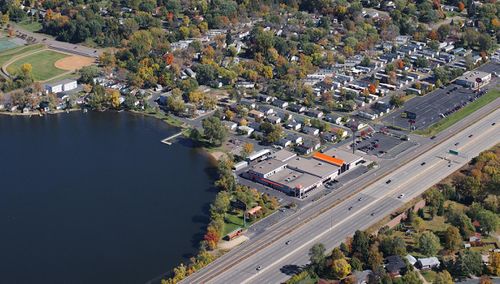
Stormwater Program for Municipal Separate Storm Sewer Systems (MS4)

The municipal separate storm sewer system (MS4) stormwater program is designed to reduce the amount of sediment and pollution that enters surface and ground water from storm sewer systems. Public entities that own or operate an MS4 play a key role in preventing or reducing the negative impacts stormwater runoff has on our valuable water resources.
Proper stormwater runoff management in urbanized areas is especially important for restoring and protecting surface waters. Urbanized areas are more likely to have activities that contribute pollutants to stormwater runoff, like applying anti/deicing mixtures to roads; fueling vehicles; grease, oil, and other spills; landscaping; and using pesticides and fertilizers. Urbanized areas have a large amount of impervious surfaces, or surfaces that rain and snowmelt cannot pass through, such as streets, driveways, rooftops, parking lots and sidewalks. Stormwater runoff from these surfaces travels faster and in higher amounts, damaging rivers, streams, and wetlands; destroying aquatic habitats; increasing the amount of pollutants that enter surface waters; and limiting groundwater recharge.
Contents
MS4 stormwater program overview
MS4 stormwater permit
- MS4 General Permit
- MS4 Annual Report
- Minneapolis 2011 Phase I Permit
- Minneapolis 2018 Phase I Permit
- St Paul 2011 Phase I Permit
MS4 General Permit reissuance
Visit the MS4 General Permit reissuance page for updates on the next MS4 General Permit.
MS4 Digital Document Library
The MS4 Digital Document Library provides guidance to help local MS4 staff meet the requirements of the six minimum control measures (MCMs) in the MS4 General Permit and assist with overall stormwater management. In addition to general guidance documents, the Digital Document Library has example documents that stormwater staff are using to manage their stormwater pollution prevention programs (SWPPPs). Common examples of documents in the library include:
- inspection and checklists and forms,
- site plan review checklists,
- documentation tracking mechanisms, or
- standard operating procedures.
All documents in the Digital Document Library are available for all site users to download and use. MPCA staff will review all materials to ensure their compliance with the MS4 General Permit prior to posting in the Digital Document Library.
Other technical assistance and guidance
- MS4 fact sheets
- Visit the MPCA MS4 website for additional guidance documents and fact sheets
- Pollution prevention guidance
- Stormwater and Wetlands - Planning and Evaluation Guidelines
- Untreated Stormwater Runoff to Lakes, Streams, and Wetlands
- MS4 case studies
- Phase II MS4 audit process
- MS4 webinars and videos
- 2017 MS4 Technical Assistance and Outreach Needs Survey Results
- Self-audit guidance for Phase II MS4s
- File:Permit Changes Listed & MS4s FINAL.xlsx - Fact sheet on proposed changes to the Construction Stormwater Permit as they relate to MS4s
Total Maximum Daily Loads (TMDLs)
- TMDL Overview
- Summary of TMDL requirements in stormwater permits
- Forms and guidance for TMDLs
- Summary of data received from permittees on MS4 TMDL permit reporting forms
- Visit the MPCA TMDL Project page for information on specific projects across the state
Other links
- MS4 staff contact information and staff assignments
- MS4 mapping tool is an electronic map tool using Geographic Information Systems (GIS) technology.
- Pond, lake, and wetland inventory
- Presentation slides
